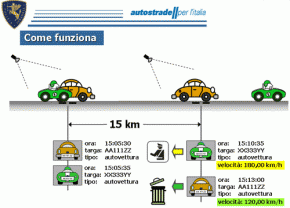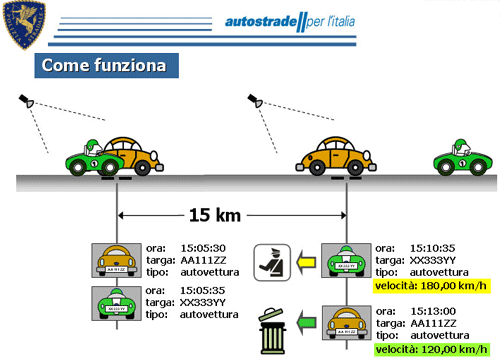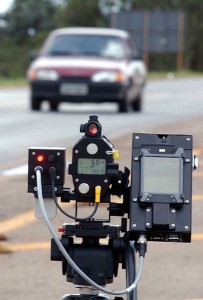The apology begins with self-defense: "We always ask permission from our customers before collecting data through their browsers." The Dutch TomTom, which for years has dominated the field of GPS devices, thus seeks to mitigate its incredible lightness. Last in a series committed by the giants of technology related to the use unorthodox and sensitive information on consumer habits.
The facts: the newspaper Algemeen Dagblad found that the Dutch police is using the data provided by TomTom to the government to place the camera there, where speed limits are frequently violated. And this, of course, has angered motorists. Why is information that they themselves have provided so unknowingly using the TomTom Navigator and then strives to give customers a real-time picture of traffic conditions.
Too bad that the company has also sold the same data to Dutch institutions and the police exploit them to make money through fines. "We came to know only now that the police used our information in this manner", it is justified Godjin Harold, CEO of TomTom. "And we do not like because it appeals to our customers." But now the omelet is done and suspicions rise.
According to the Financial Times, the Dutch company to deal with the decline in sales of surfers, is focusing on its sale of services ranging from simple retail traffic maps. Business today is that 36 percent of revenues of the TomTom. But the people involved here that we minimize. The gains from the sale of public databases to be marginal part of that 36 per cent.
"Concerning Italy, nobody in the public administration is using data like that," reassures Tammaccaro Luca, head of Italy TomTom. In any case, from now on you can no longer such a thing happen, since all the contracts will be modified so that the information may no longer be sold to third parties.
"Our services are successful because they are based on information generated by the users," continues Tammaccaro. "Information that can be made available anonymously to the authorities with whom we collaborate to improve traffic flow, safety, thus the lives of citizens." The problem is just that.
Advanced services of "geo" related to smartphones like surfers, they start to use increasing amounts of consumer data. The more you have, the more accurate, useful, efficient, even revolutionary. But this means that somewhere you are forming a high-definition photography of our habits that could end up in the wrong hands.
Ten days ago it was discovered for example that the iPhone keeps track of our movements and that archive that is easily accessible, while at the same time two million profiles of users of Sony's PlayStation Network have been stolen and sold online. Considering the deployment of advanced mobile phones, it will sell 500 million this year, it is easy to predict that these issues will become central.
In short, light such as that committed by TomTom and Apple will probably see many more. 


The facts: the newspaper Algemeen Dagblad found that the Dutch police is using the data provided by TomTom to the government to place the camera there, where speed limits are frequently violated. And this, of course, has angered motorists. Why is information that they themselves have provided so unknowingly using the TomTom Navigator and then strives to give customers a real-time picture of traffic conditions.
Too bad that the company has also sold the same data to Dutch institutions and the police exploit them to make money through fines. "We came to know only now that the police used our information in this manner", it is justified Godjin Harold, CEO of TomTom. "And we do not like because it appeals to our customers." But now the omelet is done and suspicions rise.
According to the Financial Times, the Dutch company to deal with the decline in sales of surfers, is focusing on its sale of services ranging from simple retail traffic maps. Business today is that 36 percent of revenues of the TomTom. But the people involved here that we minimize. The gains from the sale of public databases to be marginal part of that 36 per cent.
"Concerning Italy, nobody in the public administration is using data like that," reassures Tammaccaro Luca, head of Italy TomTom. In any case, from now on you can no longer such a thing happen, since all the contracts will be modified so that the information may no longer be sold to third parties.
"Our services are successful because they are based on information generated by the users," continues Tammaccaro. "Information that can be made available anonymously to the authorities with whom we collaborate to improve traffic flow, safety, thus the lives of citizens." The problem is just that.
Advanced services of "geo" related to smartphones like surfers, they start to use increasing amounts of consumer data. The more you have, the more accurate, useful, efficient, even revolutionary. But this means that somewhere you are forming a high-definition photography of our habits that could end up in the wrong hands.
Ten days ago it was discovered for example that the iPhone keeps track of our movements and that archive that is easily accessible, while at the same time two million profiles of users of Sony's PlayStation Network have been stolen and sold online. Considering the deployment of advanced mobile phones, it will sell 500 million this year, it is easy to predict that these issues will become central.
In short, light such as that committed by TomTom and Apple will probably see many more.



- Quando i clienti non leggono più le email: 7 modi per correggere il tiro (24/04/2011)
- Il segreto del suo successo, intervista a Kaj - 20/04/2011 (20/04/2011)
- TWO of France's most notorious criminals claim they fathered glamorous MEP Rachida Dati¿s love child... in a prison cell (11/03/2011)
- Song of the Day:all by Myself (27/04/2011)
- Classical Pick of the Week: The Most Often Used Chords... (10/04/2011)
No comments:
Post a Comment